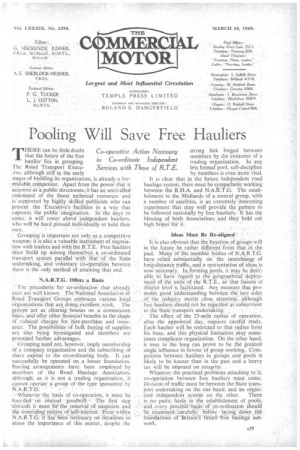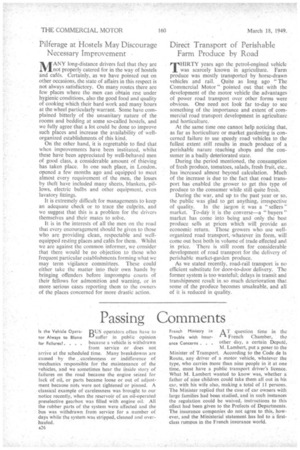Pooling Will Save Free Hauliers
Page 1

Page 2

If you've noticed an error in this article please click here to report it so we can fix it.
Co-operative A ction Necessary to Co-ordinal e Independent Services with T hose of R.T.E.
HERE Can be little doubt that the future of the free haulier lies in grouping. The Road Transport Executive, althOugh'still in the early stages of building its organization, is already a for Midable cnnIpetitar. Apart from the power that it ,• acquires as a publiedirectorate, it has an unrivalled command of the finest technical' resources and iF; supported by highly skilled publicists who can present the Executive's facilities in a way that captuies the pUblic"irriagination. In the days to conic, it will tower above independent hauliers, Who will be hard Pressed individually to hold their Grouping' is important not onlyas a competitive• weancin; it is also a valuable instrument of negotiation with traders and withthe R T F Free hauliers must build Up among themselves a co-ordinated II ' ; that the St -" transport system parallel with e a e State undertaking, and voluntary co-operation between them is the only method of attaining that end. : N.A.R.T.G. Ofi#s a Basis The precedentsfor co ordination that all exist are well known. The National Association of Road -Transport • Groups embraces various local :Organization's that are doing excellent work. The groups act as clearing -houses on a commission baSis, and offer other financial benefits in the shape of rcidurced Charges for hire purchase and insur . , . ance. The possibilitie.s of bulk buying of supplies are also being inVestigaterl and members are promised further advantages. _ . . — . , Grouping need not, however, imply membership „ _ Of a company organization and the subscribing of share capital to the co-ordinating body. It can successfully be operated on a looser foundation: Pooling .arrangements have been employed by members of ;the. Road .Haulage Association; although as .it is not a trading organization, it cannot: operate agroup of the type sponsored by Whatever the basis Of co operation it must be founded' on Thutual:.'gOodWill.-", The first 'step 'IOWA'S if rniist'be'the removal of ,suspicion' and the overriding MbtiVe of Self-inteieit:::-E,yen-Within N2A.A.T:62 it lia'fie'eri'neCessary 'iktafiiinS to stress the importance of this matter, despite the strong link forged between members by the existence of a trading organization. In any less formal pool, self-discipline by members is even more vital. ' It is clear that in the future independent road haulage system, there must be sympathetic working between the R.H.A. and KA.k.T.G: The establishment in the Midlands of a central group, With a number of satellites, is an extremely interesting experiment that May well provide the pattern to be followed nationally by free hauliers. It has the blessing of both Associations and they hold out high fiiiPes' for it.
Ideas Must, Be Re-aligned It is also obvious that the function groups will in the future be rather different, from that in the past. Miii Of the member bodies of N.A.R.T.G,. have relied ,substantially On the interchange of lOng-distance traffic, and a reorientation' of ideas is nOw-necessaiy. In forming pools, it may be 'desirable, to' tiaie regard, to the geagr,a0leal deployinene of the units of the R.T.E., so that liaison at diStrict level is facilitated. Any measure that promotes' good Understanding between the two sides Of° the industry merits close attention, although
.r 4
free hauliers should not be regarded as subservient to the State transport undertaking.
The 'effect ,of the 25-mile radius of operation, after the appointed day,' requires careful study. Each haulier will be restricted to that radius from his base, and this physical limitation May, sometimes complicate Organization. On the 'other hand, it may in the long rim prove to be tbi greatest single influence in favour of group Working.. Coinpetition between hauliers in groups and pools is likely to be keener than in the past and a heavy tax will be imposed on integrity..
Whatever the practical problems attaching to it co-operation between free hauliers -must come: Division Of traffic miist be-between the'State transport undertaking on the One hand, and an organ ized independent . system on the other, There is no panic hastein the establishment of :pools-; and every possible ''.0-ordinatiOn shonla be ixainined,:darefully': befbrer laying down the
Pilferage at Hostels May Discourage Necessary Improvement
MANY long-distance drivers feel that they are not properly catered for in the way of hostels and cafés. Certainly, as we have pointed out on other occasions, the state of affairs in this respect is not always satisfactory. On many routes there arc few places where the men can obtain rest under hygienic conditions, also the good food and quality of cooking which their hard work and many hours at the wheel particularly warrant. Some have complained bitterly of the unsanitary nature of the rooms and bedding at some so-called hostels, and we fully agreethat a lot could be done to improve such places and increase the availability of wellorganized establishments of this kind.
On the other hand, it is regrettable to find that when improvements have been instituted, whilst these have been appreciated by well-behaved men of good class, a considerable amount of thieving has taken place. In one such place, in London, opened a few months ago and equipped to meet almost every requirement of the men, the losses by theft have included many sheets, blankets, pillows, electric bulbs and other equipment, even lavatory fittings.
It is extremely difficult for managements to keep an adequate check or to trace the culprits, and we suggest that this is a problem for the drivers themselves and their mates to solve.
It is in the interests of all the men on the road that every encouragement should be given to those who are providing clean, respectable and wellequipped resting places and cafés for them. Whilst we are against the common informer, we consider that there would be no objection to those who frequent particular establishments forming what we may term vigilance committees. These could either take the matter into their own hands by bringing offenders before impromptu courts of their fellows for admonition and warning, or in more serious cases reporting them to the owners of the pines concerned for more drastic action.
Direct Transport of Perishable Farm Produce by Road
orrtHIRTY years ago the petrol-engined vehicle 1 was scarcely known in agriculture. Farm produce was mostly transported by horse-drawn vehicles and rail. Quite as long ago "The Commercial Motor" pointed out that with the development of the motor vehicle the advantages of power road transport over other forms were obvious. One need not look far to-day to see something of the importance and extent of commercial road transport development in agricultureand horticulture.
At the same time one cannot help noticing that, as far as horticulture or market gardening is concerned failure to use speedy road vehicles to the fullest extent still results in much produce of a perishable nature reaching shops and the consumer in a badly deteriorated state.
During the period Mentioned, the consumption of fresh produce, tomatoes, salads, fresh fruit, etc., has increased almost beyond calculation. Much of the increase is due to the fact that road transport has enabled the grower to get this type of produce to the consumer while still quite fresh.
During the war, and up to the past year or so, the public was glad to get anything, irrespective of quality. In the jargon it was a "sellers" market. To-day it is the converse—a " buyers " market has come into being and only the best produce sells at prices which will provide an economic return. Those growers who use wellorganized road transport, 'whatever its form, will come out best both in volume of trade effected and in price. There is still room for considerable development of road transport for the delivery of perishable market-garden produce.
As we stated recently, road-rail transport is no efficient substitute for door-to-door delivery. The former system is too wasteful; delays in transit and transhipment result in so much deterioration that some of the produce becomes unsaleable, and all of it is reduced in quality.


























